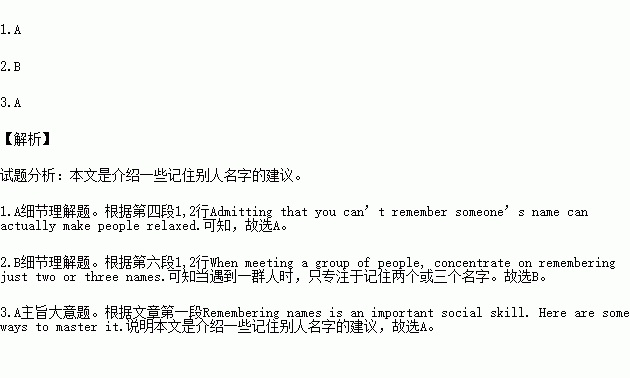题目内容
Remembering names is an important social skill. Here are some ways to master it.
Recite and repeat in conversation.
When you hear a person's name, repeat it. Immediately say it to yourself several times without moving your lips. You could also repeat the name in a way that does not sound forced or artificial.
Ask the other person to recite and repeat.
You can let other people help you remember their names. After you've been introduced to someone, ask that person to spell the name and pronounce it correctly for you. Most people will be pleased by the effort you're making to learn their names.
Admit you don't know.
Admitting that you can’t remember someone’s name can actually make people relaxed. Most of them will feel sympathy if you say, "I'm working to remember names better. Yours is right on the tip of my tongue. What is it again?"
Use associations.
Link each person you meet with one thing you find interesting or unusual. For example, you could make a mental note: "Vicki Cheng…… tall, black hair." To reinforce(加强) your associations, write them on a small card as soon as possible.
Limit the number of new names you learn at one time.
When meeting a group of people, concentrate on remembering just two or three names. Free yourself from remembering everyone. Few of the people in mass introductions expect you to remember their names. Another way is to limit yourself to learning just first names. Last names can come later.
Go early.
Consider going early to conferences, parties and classes. Sometimes just a few people show up on time. That's fewer names for you to remember. And as more people arrive, you can hear them being introduced to others—an automatic review for you.
1.If you can't remember someone's name, you may .
A. tell him the truth B. tell him a white lie
C. ask him for pity D. ask others to help you
2.When you meet a group of people, it is better to remember .
A. all their names
B. a couple of names first
C. just their last names
D. as many names as possible
3.What does the text mainly tell us?
A. Tips on an important social skill.
B. Importance of attending parties.
C. How to make use of associations.
D. How to recite and repeat names.
 轻松暑假总复习系列答案
轻松暑假总复习系列答案
